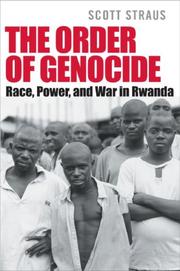
ISBN: 9780801444487 0801444489 9780801467158 0801467152 9780801474927 0801474922 0801467144 Year: 2006 Publisher: Ithaca Cornell University Press
Abstract | Keywords | Export | Availability | Bookmark
 Loading...
Loading...Choose an application
- Reference Manager
- EndNote
- RefWorks (Direct export to RefWorks)
The Rwandan genocide has become a touchstone for debates about the causes of mass violence and the responsibilities of the international community. Yet a number of key questions about this tragedy remain unanswered: How did the violence spread from community to community and so rapidly engulf the nation? Why did individuals make decisions that led them to take up machetes against their neighbors? And what was the logic that drove the campaign of extermination?According to Scott Straus, a social scientist and former journalist in East Africa for several years (who received a Pulitzer Prize nomination for his reporting for the Houston Chronicle), many of the widely held beliefs about the causes and course of genocide in Rwanda are incomplete. They focus largely on the actions of the ruling elite or the inaction of the international community. Considerably less is known about how and why elite decisions became widespread exterminatory violence.Challenging the prevailing wisdom, Straus provides substantial new evidence about local patterns of violence, using original research-including the most comprehensive surveys yet undertaken among convicted perpetrators-to assess competing theories about the causes and dynamics of the genocide. Current interpretations stress three main causes for the genocide: ethnic identity, ideology, and mass-media indoctrination (in particular the influence of hate radio). Straus's research does not deny the importance of ethnicity, but he finds that it operated more as a background condition. Instead, Straus emphasizes fear and intra-ethnic intimidation as the primary drivers of the violence. A defensive civil war and the assassination of a president created a feeling of acute insecurity. Rwanda's unusually effective state was also central, as was the country's geography and population density, which limited the number of exit options for both victims and perpetrators.In conclusion, Straus steps back from the particulars of the Rwandan genocide to offer a new, dynamic model for understanding other instances of genocide in recent history-the Holocaust, Armenia, Cambodia, the Balkans-and assessing the future likelihood of such events.
Polemology --- Rwanda --- Genocide --- History --- Atrocities --- Ethnic relations. --- Génocide --- Atrocities. --- Histoire --- Atrocités --- Relations interethniques --- 840 Samenleving en staat --- 855.3 Genocide --- 881.2 Centraal-Afrika --- HISTORY --- Africa / Central --- History & Archaeology --- Regions & Countries - Africa
Book
ISBN: 9053120165 Year: 1994 Volume: *1 Publisher: Groot-Bijgaarden Scoop
Abstract | Keywords | Export | Availability | Bookmark
 Loading...
Loading...Choose an application
- Reference Manager
- EndNote
- RefWorks (Direct export to RefWorks)
Internal politics --- Congo --- Afrika --- Afrique --- Politiek --- Politique --- politieke geschiedenis --- Zaïre --- 325 <675> --- 967.5.04 --- 838 Duurzame Ontwikkeling --- 841 Politiek Bestel --- 841.1 Democratisering --- 881 Afrika --- 881.2 Centraal-Afrika --- Zaïre.
Multi
ISSN: 16520432 16537548 ISBN: 9789185114641 Year: 2003 Volume: 27
Abstract | Keywords | Export | Availability | Bookmark
 Loading...
Loading...Choose an application
- Reference Manager
- EndNote
- RefWorks (Direct export to RefWorks)
835 Natuurlijke rijkdommen --- 881.2 Centraal-Afrika --- Internal security --- Mines and mineral resources --- Deposits, Mineral --- Mineral deposits --- Mineral resources --- Mines and mining --- Mining --- Security, Internal --- Congo (Democratic Republic) --- History. --- Natural resources --- Geology, Economic --- Minerals --- Insurgency --- Subversive activities
Book
ISBN: 0582112206 Year: 1972 Publisher: London Longman
Abstract | Keywords | Export | Availability | Bookmark
 Loading...
Loading...Choose an application
- Reference Manager
- EndNote
- RefWorks (Direct export to RefWorks)
Nationalism --- Guerrillas --- Nationalisme --- Guérillas --- Angola --- History --- Histoire --- 815 Geschiedenis --- 821.1 Volkenrecht --- 826 Imperialisme, Kolonialisme --- 840 Samenleving en staat --- 846 Identiteit --- 855.1 Strategie --- 858.1 Politiek geweld --- 881.2 Centraal-Afrika --- Guérillas
Book
ISBN: 2841462544 9782841462544 Year: 1995 Publisher: Paris Syros
Abstract | Keywords | Export | Availability | Bookmark
 Loading...
Loading...Choose an application
- Reference Manager
- EndNote
- RefWorks (Direct export to RefWorks)
Africa, West --- Politics and government --- Rural conditions --- 841.1 Democratisering --- 841.3 Politieke bewegingen --- 881.2 Centraal-Afrika --- 881.5 West-Afrika --- Africa, Western --- West Africa --- Western Africa --- Rural conditions. --- Africa, West - Politics and government - 1960 --- -Africa, West - Rural conditions
Book
ISBN: 906445972X 9789064459726 Year: 1983 Publisher: Berchem Epo
Abstract | Keywords | Export | Availability | Bookmark
 Loading...
Loading...Choose an application
- Reference Manager
- EndNote
- RefWorks (Direct export to RefWorks)
855.2 Private actoren --- 876.1 Defensie --- 881 Afrika --- 881.2 Centraal-Afrika --- 881.3 Noord-Afrika --- 882.2 Zuid-Amerika --- 883.4 West-Azië --- 883.5 Zuid-Azië --- 936 --- soldaten --- hedendaagse wereld na 1945 --- temps contemporains après 1945
Book
ISBN: 9029026901 9063033664 9789063033668 9789029026901 Year: 1988 Publisher: Amsterdam Meulenhoff
Abstract | Keywords | Export | Availability | Bookmark
 Loading...
Loading...Choose an application
- Reference Manager
- EndNote
- RefWorks (Direct export to RefWorks)
Description by a Belgian journalist on a trip to Zaire, the former Belgian Congo and how the country has changed since the colonial time.
081122.jpg --- Zaïre reisbeschrijvingen --- Joris, Lieve, --- Journeys --- Congo (Democratic Republic) --- Congo (République démocratique) --- Description and travel. --- Descriptions et voyages --- 815 Geschiedenis --- 826 Imperialisme, Kolonialisme --- 881.2 Centraal-Afrika --- 884.4 West-Europa --- 890 Verhalende literatuur --- Zaïre ; reisbeschrijvingen
Book
ISBN: 9029525312 Year: 2000 Publisher: Amsterdam Arbeiderspers
Abstract | Keywords | Export | Availability | Bookmark
 Loading...
Loading...Choose an application
- Reference Manager
- EndNote
- RefWorks (Direct export to RefWorks)
908 <6> --- 960.04 --- 881 Afrika --- 881.1 Oost-Afrika --- 881.2 Centraal-Afrika --- 881.5 West-Afrika --- 890 Verhalende literatuur --- History of Africa --- journalistiek proza (genre) --- reisverhalen (genre)

ISBN: 2870900015 9782870900017 Year: 1983 Volume: 33-34 Publisher: Bruxelles Bruxelles Contradictions Editions Vie Ouvrière
Abstract | Keywords | Export | Availability | Bookmark
 Loading...
Loading...Choose an application
- Reference Manager
- EndNote
- RefWorks (Direct export to RefWorks)
#SBIB:327.4H74 --- 339.96 --- 825 Ontwikkelingssamenwerking --- 830 Economie --- 881 Afrika --- 881.2 Centraal-Afrika --- 881.3 Noord-Afrika --- 883 Azië --- 883.3 Zuidoost-Azië --- 884.4 West-Europa --- 339.96 Ontwikkelingshulp. Ontwikkelingssamenwerking. Ontwikkelingsproblematiek --- Ontwikkelingshulp. Ontwikkelingssamenwerking. Ontwikkelingsproblematiek --- Ontwikkelingshulp en -samenwerking --- Development aid. Development cooperation --- Belgium --- ontwikkelingshulp --- Economic assistance, Belgian - Developing countries --- Belgium - Foreign economic relations - Developing countries --- Aide économique belge --- Economic assistance, Belgian
Book
ISBN: 0140220275 Year: 1977 Publisher: Harmondsworth Penguin
Abstract | Keywords | Export | Availability | Bookmark
 Loading...
Loading...Choose an application
- Reference Manager
- EndNote
- RefWorks (Direct export to RefWorks)
On the basis of the so-called Luande trials where mercenaries for the FNLA and UNITA - União Nacional Para a Independencia Total de Angola - National Union for the Total Independence of Angola were put to trial by the MPLA-government in Angola. The authors try to draw the profile of the contemporary mercenary and who makes (mis)use of him, which policy lies behind his use. National and international law concerning mercenaries.
Polemology --- Mercenary troops --- Foreign enlistment --- Mercenaires --- Foreign enlistment. --- Mercenary troops. --- 821 Internationaal Recht --- 822.2 Regionale Organisaties --- 826 Imperialisme, Kolonialisme --- 841 Politiek Bestel --- 855.2 Private actoren --- 881 Afrika --- 881.2 Centraal-Afrika --- 882.4 Noord-Amerika --- 884.2 Noord-Europa --- 884.4 West-Europa --- Mercenaries (Soldiers) --- Troops, Mercenary --- Enlistment --- Armies --- Non-state actors (International relations) --- Soldiers --- Private military companies --- Military offenses

 Search
Search Feedback
Feedback About
About Help
Help News
News